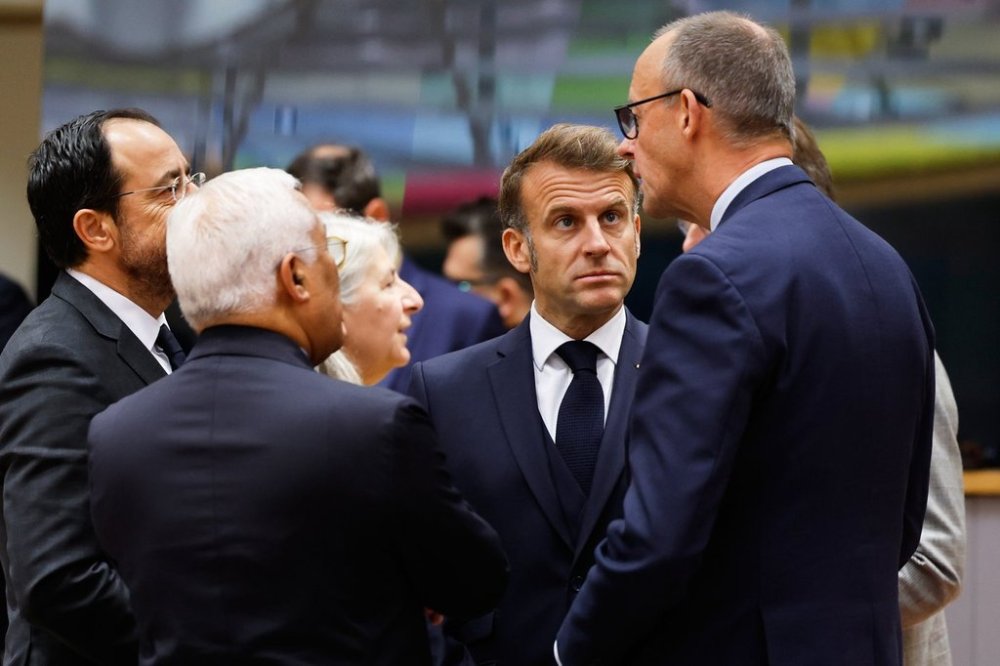EU leaders endorse a plan to ensure that Europe can defend itself from outside attack by 2030
Advertisement
Read this article for free:
or
Already have an account? Log in here »
To continue reading, please subscribe:
Monthly Digital Subscription
$1 per week for 24 weeks*
- Enjoy unlimited reading on winnipegfreepress.com
- Read the E-Edition, our digital replica newspaper
- Access News Break, our award-winning app
- Play interactive puzzles
*Billed as $4.00 plus GST every four weeks. After 24 weeks, price increases to the regular rate of $19.00 plus GST every four weeks. Offer available to new and qualified returning subscribers only. Cancel any time.
Monthly Digital Subscription
$4.75/week*
- Enjoy unlimited reading on winnipegfreepress.com
- Read the E-Edition, our digital replica newspaper
- Access News Break, our award-winning app
- Play interactive puzzles
*Billed as $19 plus GST every four weeks. Cancel any time.
To continue reading, please subscribe:
Add Free Press access to your Brandon Sun subscription for only an additional
$1 for the first 4 weeks*
*Your next subscription payment will increase by $1.00 and you will be charged $16.99 plus GST for four weeks. After four weeks, your payment will increase to $23.99 plus GST every four weeks.
Read unlimited articles for free today:
or
Already have an account? Log in here »
BRUSSELS (AP) — European Union leaders on Thursday endorsed a plan to ensure that Europe can defend itself against an outside attack by the end of the decade as concern mounts that Russia is already probing the 27-nation bloc’s defenses.
“Russia’s war of aggression against Ukraine and its repercussions for European and global security in a changing environment constitute an existential challenge,” the leaders said in a statement during a summit in Brussels.
They called on national governments “to advance on concrete projects to be launched in the first half of 2026” in line with the new plan, dubbed Readiness 2030, which was drawn up by the European Commission, the EU’s executive branch.

A top priority will be to erect drone defenses to detect, track and disable rogue drones, following a series of troubling airspace violations across Europe over the last month – some close to Europe’s borders with Russia, Belarus and Ukraine.
This European Drone Defense Initiative would be a key part of a broader scheme dubbed Eastern Flank Watch to strengthen defenses along Europe’s eastern border on land, in the Baltic and Black seas and in the air, as well as against hybrid attacks.
The leaders said that “to respond to the most immediate needs and threats” the first projects should focus on building anti-drone and air defense capabilities and make full use of EU funds to do so.
The commission estimates that EU defense spending this year will total around 392 billion euros ($457 billion), almost double the amount of four years ago, before Russia launched its full-scale invasion of Ukraine.
It believes that some 3.4 trillion euros ($4 trillion) will probably be spent on defense over the next decade. To help, it intends to propose boosting the EU’s long-term budget for defense and space to 131 billion euros ($153 billion).
The overarching aim of the Readiness 2030 plan is to encourage the member countries to decide who among them should take the lead on which projects, and then to launch them within the first six months of next year.
At least 40% of military purchases would have to be done jointly – making them cheaper and encouraging countries to use interoperable weapons and standards – by late 2027.
Projects, contracts and financing on “critical capabilities” – drones or satellites, for example – would need to be settled by the end of 2028, with the whole process finalized two years later.
Another key part of the plan is to provide security guarantees for Ukraine. The leaders underlined “the importance of close cooperation with Ukraine and of its integration with and contribution to the European defense industry.”

